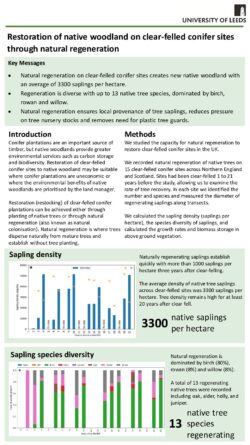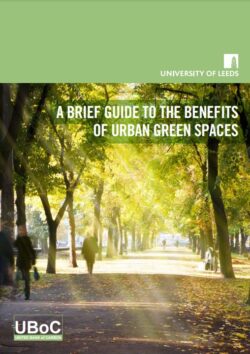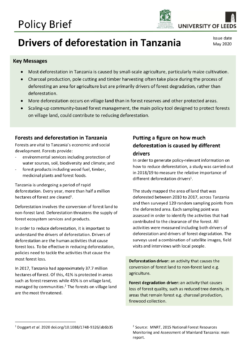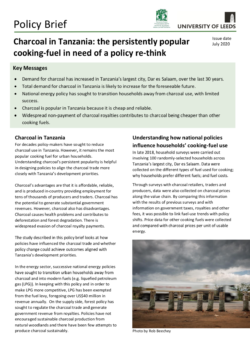Policy Briefs
What do the findings of our research mean for policy makers?
Below we are compiling a range of policy briefs and the associated research papers from across the LEAF network.
 Restoration of native woodland on clear-felled conifer sites through natural regeneration
Restoration of native woodland on clear-felled conifer sites through natural regeneration
Conifer plantations are an important source of timber, but native woodlands provide greater environmental services such as carbon storage and biodiversity. Restoration of clear felled conifer sites to native woodland may be suitable where conifer plantations are uneconomic or where the environmental benefits of native woodlands are prioritised by the land manager. Restoration (restocking) of clear felled conifer plantations can be achieved either through planting of native trees or through natural regeneration (also known as natural colonisation). Natural regeneration is where trees disperse naturally from mature trees and establish without tree planting. This policy brief presents the results and implications from a study of natural regeneration capacity to restore clear-felled conifer sites in the UK.
 Benefits of urban green spaces
Benefits of urban green spaces
Urban green spaces such as domestic gardens, parks and woodlands provide a multitude of benefits to human urban populations, and a vital habitat for wildlife. By improving physical fitness and reducing depression, the presence of green spaces can enhance the health and wellbeing of people living and working in cities. Green spaces also indirectly impact our health by improving air quality and limiting the impact of heatwaves by reducing urban temperatures. In addition, urban vegetation stores carbon, helping to mitigate climate change, and reduces the likelihood of flooding by storing excess rain water. This brief guide presents a summary of the existing literature around the importance of urban green space.
Drivers of deforestation in Tanzania
Understanding the drivers of tropical deforestation can contribute to more effective policies to reduce deforestation. New research describes the role of small-scale agriculture in driving most deforestation in Tanzania, often alongside other activities such as livestock grazing. Led by researchers from the School of Earth and Environment, the study highlights the need for policies that encourage land-owners, including communities, to retain natural forests on their land.
Read the policy brief here.
The policy brief is also available in Swahili here.
Charcoal consumption in Tanzania
Transitioning urban households from using charcoal to using modern cooking fuels has been a policy priority for at least 20 years in Tanzania. However, charcoal has remained persistently popular, with the majority of urban households continuing to use charcoal as their main cooking fuel. The environmental and economic policy implications of charcoal’s persistent popularity are explored in a recent publication involving researchers from the School of Earth and Environment. A summary of the research and the resulting policy recommendations are presented in this policy brief.


